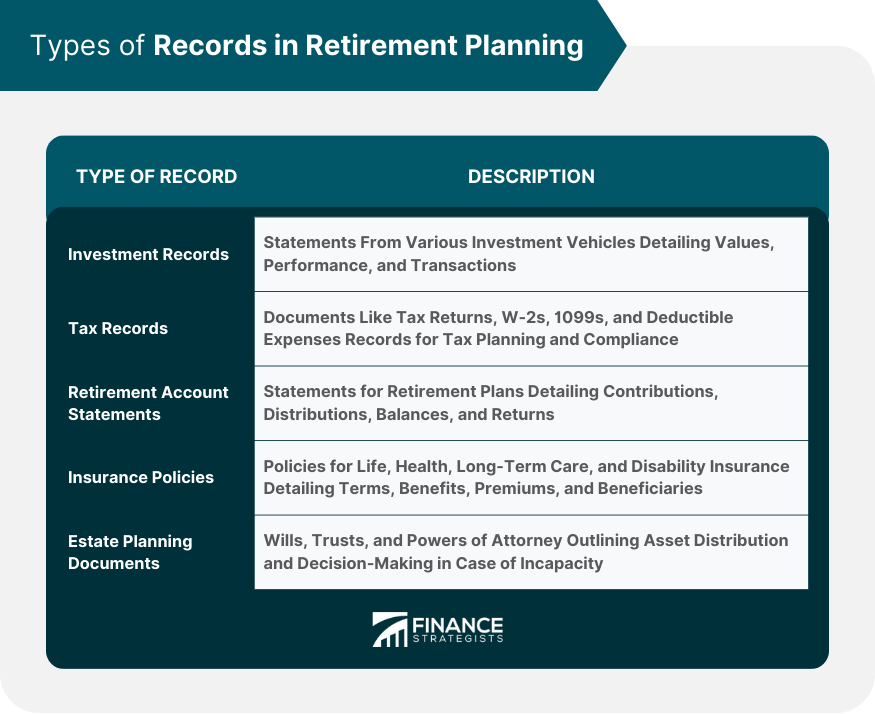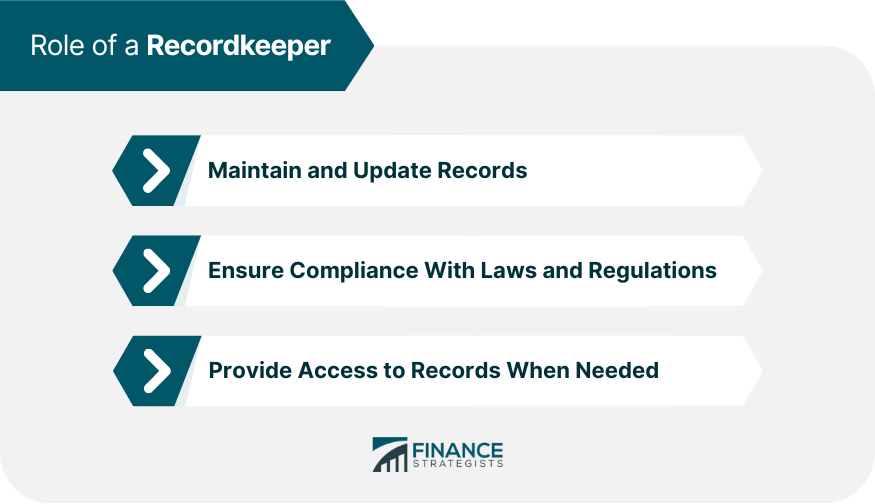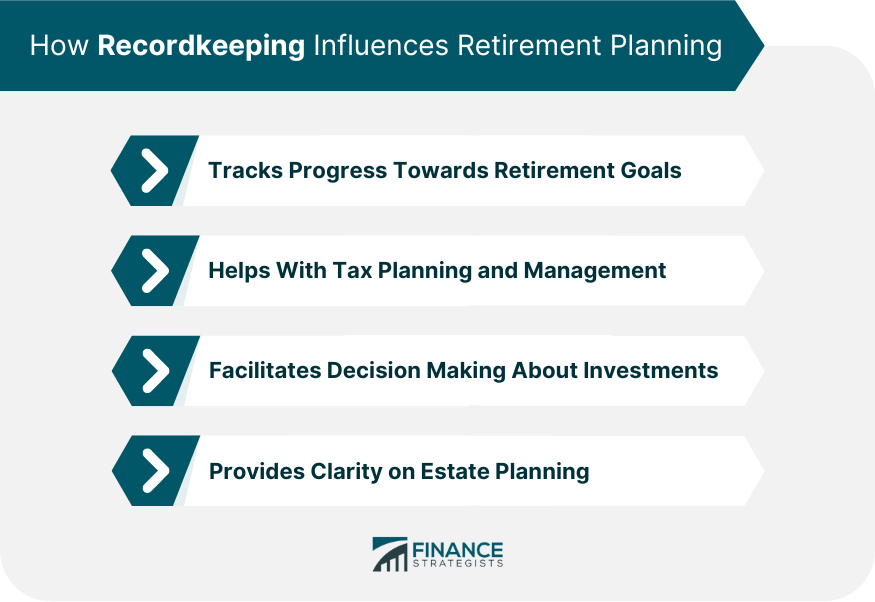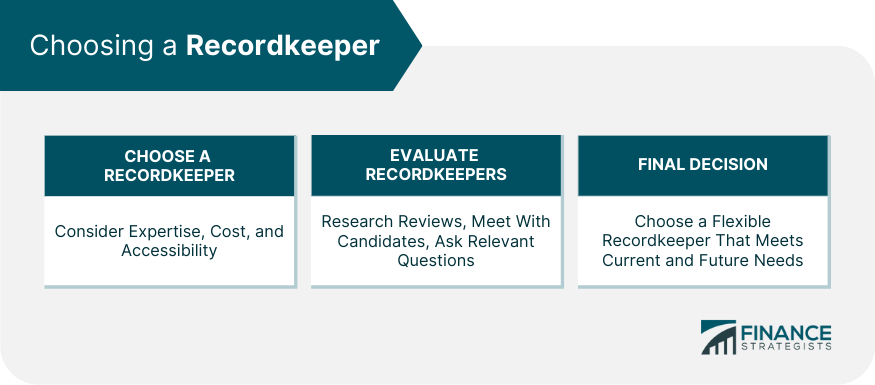A recordkeeper is a professional or organization responsible for maintaining and organizing records related to an individual's retirement plans. These records may include investment statements, tax returns, retirement account summaries, insurance policies, and estate planning documents. Recordkeeping plays a pivotal role in retirement planning. It allows individuals to track their progress toward retirement goals, facilitates tax planning, assists in investment decision-making, and provides clarity on estate planning. Effective recordkeeping can help individuals accurately understand their financial standing and make informed decisions, contributing to a more secure and fulfilling retirement. Investment records include statements from brokerage accounts, mutual funds, and other investment vehicles. These records provide critical information about investment values, performance, and transactions. Tax records encompass documents such as annual tax returns, W-2 forms, 1099 forms, and records of deductible expenses. Keeping these records organized is crucial for tax planning and ensuring compliance with tax laws. Retirement account statements for IRAs, 401(k)s, and other retirement savings plans provide details about contributions, distributions, account balances, and investment returns. These statements are essential for tracking progress toward retirement goals. Insurance policies, including life, health, long-term care, and disability insurance, are key components of retirement planning. These documents contain information about policy terms, benefits, premiums, and beneficiaries. Estate planning documents, such as wills, trusts, and powers of attorney, dictate how an individual's assets will be distributed upon their death. These documents also specify who will make financial and healthcare decisions on their behalf if they become incapacitated. Recordkeepers are responsible for maintaining and updating all records related to an individual's retirement plan. This includes recording transactions, tracking investment performance, and updating account balances. Recordkeepers help ensure compliance with relevant laws and regulations, including tax laws and regulations related to retirement accounts. They provide necessary tax forms, assist with reporting requirements, and keep abreast of changes in the legal landscape. A critical role of a recordkeeper is to provide access to records when needed. This could be during tax season, when making investment decisions, or when dealing with estate planning matters. In today's digital age, recordkeeping has evolved from physical filing systems to electronic databases. Digital recordkeeping offers advantages such as easy accessibility, efficient organization, and the ability to quickly search and retrieve records. However, it also raises concerns about data security and privacy. Physical recordkeeping, on the other hand, is perceived as more secure but can be cumbersome and prone to risks such as damage or loss. A blend of both methods is often the most practical approach. Regular review of retirement account statements and investment records helps individuals assess their progress toward retirement goals. It allows them to determine whether they are on track or need to adjust their savings or investment strategies. Tax records play a vital role in tax planning. By reviewing these records, individuals can identify tax-saving opportunities, plan for tax liabilities, and ensure timely payment of taxes, thereby avoiding penalties for non-compliance. Moreover, keeping accurate tax records is essential for effectively dealing with any potential tax audits or inquiries. Investment records provide valuable information about the performance of various investment vehicles. By analyzing these records, individuals can make informed decisions about buying, selling, or holding certain investments. Additionally, a well-kept record of past investment decisions can serve as a learning tool, helping individuals refine their investment strategies over time. Accurate and organized estate planning documents ensure that an individual's wishes regarding their assets are clearly defined and can be executed smoothly upon their demise. Without proper recordkeeping, the execution of these documents could be delayed or disputed, causing undue stress for the bereaved. Expertise and Experience: A good recordkeeper should have a deep understanding of retirement planning and tax laws and a proven track record of maintaining and organizing records accurately and securely. Cost: The cost of recordkeeping services can vary widely. It's important to understand the fee structure and ensure that the cost aligns with the value provided. Accessibility and Ease of Use: A user-friendly interface and easy access to records are crucial. A good recordkeeper should provide a system that allows you to retrieve records quickly and easily. Researching Recordkeeper Reviews and Ratings: Online reviews and ratings can provide valuable insights into a recordkeeper's performance. Look for consistent positive feedback across multiple review platforms. Meeting With Potential Recordkeepers: A face-to-face meeting or a virtual conversation with potential recordkeepers can provide a deeper understanding of their services, work style, and compatibility with your needs. Asking Relevant Questions: Prepare a list of questions to ask potential recordkeepers. These could relate to their experience, data security measures, customer support, and contingency plans in case of data loss. After considering all factors and evaluating potential recordkeepers, make an informed decision. Remember, the right recordkeeper for you should not only meet your current needs but also be able to accommodate changes as your retirement plan evolves. Technology has revolutionized recordkeeping by enabling the digitization of records, automation of record-keeping tasks, and the use of analytics for better decision-making. Cloud-based systems have further increased accessibility and scalability. Digital recordkeeping offers benefits such as accessibility, efficiency, and scalability. However, it also presents challenges such as potential data breaches and reliance on technology that can sometimes fail. While digital recordkeeping has many advantages, it's crucial to ensure robust security measures are in place. These could include encryption, two-factor authentication, and regular backups. A recordkeeper is a professional or organization responsible for maintaining and organizing records related to an individual's retirement plans. Recordkeeping is an essential part of retirement planning that involves collecting, organizing, and maintaining records related to an individual's retirement plans. Effective recordkeeping helps individuals track their progress toward retirement goals, facilitates tax planning, assists in investment decision-making, and provides clarity on estate planning. The role of a recordkeeper is to maintain and update records, ensure compliance with laws and regulations, and provide access to records when needed. Digital recordkeeping has revolutionized the process, offering benefits such as accessibility, efficiency, and scalability. However, it also presents challenges such as potential data breaches and reliance on technology that can sometimes fail. When choosing a recordkeeper, it's important to consider expertise, cost, accessibility, and ease of use. Evaluating potential recordkeepers, researching reviews, meeting with candidates, and asking relevant questions can help make an informed decision. Ultimately, the right recordkeeper should meet both current and future needs, be flexible, and accommodate changes in retirement plans.What Is a Recordkeeper?
Understanding the Basics of Recordkeeping
Types of Records in Retirement Planning
Investment Records
Tax Records
Retirement Account Statements
Insurance Policies
Estate Planning Documents

Role of a Recordkeeper
Maintaining and Updating Records
Ensuring Compliance with Laws and Regulations
Providing Access to Records When Needed

Digital vs Physical Recordkeeping
How Recordkeeping Influences Retirement Planning

Tracking Progress Towards Retirement Goals
Helping With Tax Planning and Management
Facilitating Decision-Making About Investments
Providing Clarity on Estate Planning
Choosing a Recordkeeper
Considerations When Choosing a Recordkeeper
Evaluating Potential Recordkeepers
Making the Final Decision

Role of Technology in Recordkeeping
How Technology Has Changed Recordkeeping
Benefits and Drawbacks of Digital Recordkeeping
Security Considerations With Digital Recordkeeping
Final Thoughts
Recordkeeper FAQs
Recordkeeping in retirement planning is crucial as it helps track progress toward retirement goals, facilitates tax planning and management, aids in investment decision-making, and provides clarity in estate planning. By keeping accurate and organized records, individuals can make informed decisions and ensure a smoother transition into retirement.
The types of records involved in retirement planning include investment records, tax records, retirement account statements, insurance policies, and estate planning documents. These records provide a comprehensive view of an individual's financial standing and retirement readiness.
When choosing a recordkeeper for retirement planning, consider their expertise and experience in retirement planning and tax laws, the cost of their services, and the accessibility and ease of use of their recordkeeping system. It's also important to evaluate their reputation and ask relevant questions about their services.
Technology has significantly influenced recordkeeping in retirement planning. It has enabled the digitization of records, making them easily accessible and efficiently organized. Moreover, the automation of record-keeping tasks and the use of analytics has improved decision-making in retirement planning. However, digital recordkeeping also raises concerns about data security, making it important to choose a recordkeeper with robust security measures.
While it's possible to handle your own recordkeeping in retirement planning, it can be a complex and time-consuming task, especially without a background in finance or tax laws. A professional recordkeeper not only maintains and organizes records but also ensures compliance with laws and provides expert guidance. Therefore, hiring a professional recordkeeper is often a worthwhile investment.
True Tamplin is a published author, public speaker, CEO of UpDigital, and founder of Finance Strategists.
True is a Certified Educator in Personal Finance (CEPF®), author of The Handy Financial Ratios Guide, a member of the Society for Advancing Business Editing and Writing, contributes to his financial education site, Finance Strategists, and has spoken to various financial communities such as the CFA Institute, as well as university students like his Alma mater, Biola University, where he received a bachelor of science in business and data analytics.
To learn more about True, visit his personal website or view his author profiles on Amazon, Nasdaq and Forbes.













